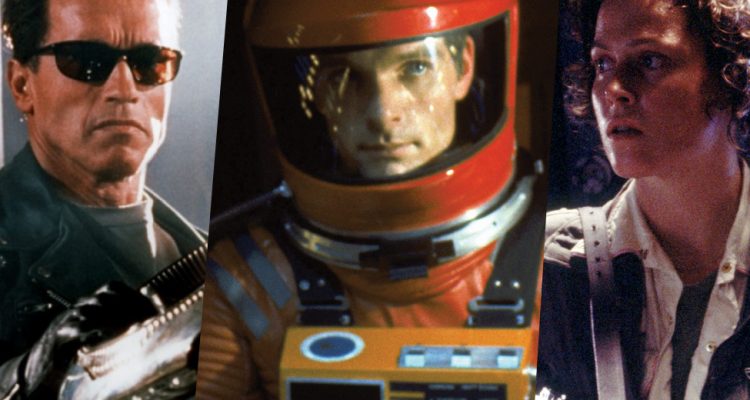
30. “The Host” (2006)
The first, and still the greatest of Korean genius Bong Joon-ho‘s experiments in sci-fi, “The Host” is actually a genre hybrid: part monster movie, part kitchen-sink social realist drama, part family dramedy and part political satire. But the way he blends these textures together is completely unique, making the story, of one misfit family searching for their youngest member as a giant pollution-induced creature terrorizes Seoul, into one seamless, grotesque, hilarious whole: a beautiful mutant.
 29. “Seconds” (1966)
29. “Seconds” (1966)
If you kind of enjoy the woozy tachycardia feeling you get from a bronchial fever dream, may we prescribe John Frankenheimer‘s brilliant, impressionistic cautionary tale? A suburban schlub essentially sells his soul for a chance to start over, looking like Rock Hudson, but the life he goes on to lead proves just as dissatisfying as the one he left behind. The distortion-heavy cinematography from James Wong Howe is stunning, but for visceral effect, nothing beats the gut-punch of one of the most stunningly downbeat endings this side of “The Mist.”
 28. “Predator” (1987)
28. “Predator” (1987)
John McTiernan‘s narratively lean alien slasher film gets a unexpected upgrade in terms of creature effects (the design of the multiple-mandibled Predator may be Stan Winston‘s finest hour) and shooting style–seriously, how ludicrously verdant and steamy does Donald McAlpine‘s luscious cinematography make the Mexican jungle seem? How never-more-bulging Arnie’s biceps? But this is a McTiernan movie and no mistake — what it lacks in robust sci-fi mythology it more than makes up for in sleek action chops, which its hundred sequels, spinoffs and crossovers sorely lack.
 27. “Upstream Color” (2013)
27. “Upstream Color” (2013)
Much as we enjoyed being confounded by Shane Carruth‘s debut “Primer,” there was a coldness to its cleverness. But his second film, the silvery-elusive “Upstream Color” in which he again stars, this time alongside Amy Seimetz, addresses that directly. Without losing any of his trademark ethereal inventiveness, in which pigs, memories and Walt Whitman all play a part, Carruth’s second film is all about the physics of human connection: a sci-fi love story in which the two sides–love and science–are both subjects for analysis, and sources of profound wonder.
 26. “Solaris” (1972)
26. “Solaris” (1972)
Something of a response to “2001” a few years earlier, which Tarkovsky didn’t like (Kubrick, in turn, didn’t think much of Tarkovsky’s film), the Russian master’s adaptation of Stanislaw Lem’s novel about a man who travels to a space station to find a vision of his dead wife, is a dreamy, psychologically rich picture with haunting resonances: the rare film in the genre to feel spiritual as well as spectacular.
 25. “The Man Who Fell To Earth” (1976)
25. “The Man Who Fell To Earth” (1976)
Probably David Bowie’s most indelible screen role that doesn’t involve Muppets and a young Jennifer Connelly, “The Man Who Fell To Earth” sees him play an alien who comes to Earth in search of water, gets rich, falls in love, and is pursued and locked up by the authorities. It’s an odd beast, even by Nicolas Roeg standards, but an often profound, powerful one, which captures Bowie’s essence better than any other movie.
 24. “Videodrome” (1983)
24. “Videodrome” (1983)
Not all films that spawn cult followings have such a lot of meat on their bones, but “Videodrome,” David Cronenberg‘s splattery-gross yet clinically brilliant surrealist technophobia satire is the rare cultish artifact that absolutely repays the kind of obsessive rewatching it inspires. Devastatingly smart and oddly current, whatever the era you’re watching it, it portrays a never more oleaginous James Woods sliding slowly into a nightmarish quagmire in which flesh and technology have fused to become something neither machine nor human, but an amplification of the worst of both worlds.
 23. “Mad Max: Fury Road” (2015)
23. “Mad Max: Fury Road” (2015)
“Mad Max: Fury Road” is first and foremost an action movie, and if this was an action movie list, would be nestling comfortably in the Top 10. But even if you somehow aren’t wowed by the stuntwork, it serves as the most fully realized version of George Miller’s extraordinary and pioneering post-apocalyptic universe. Literally thousands have copied him across comics, videogames, TV or other movies, but the language, the characters, the design make this the definitive wasteland.
 22. “The Day The Earth Stood Still” (1951)
22. “The Day The Earth Stood Still” (1951)
Run from the hills from the Keanu Reeves remake and stick with the 1951 Robert Wise original take on this sci-fi parable, probably the finest movie of the period when sci-fi first captured the imagination of the public. Following the aftermath of a flying saucer attempting to make first contact with humanity, the violence that follows from humanity, and the rampaging robot that’s unleashed, the film tells a moving story of peace that resonates today, but must have done so much more so just six years after the end of World War Two.
 21. “Invasion Of The Body Snatchers” (1978)
21. “Invasion Of The Body Snatchers” (1978)
Klaatu Barada Nikto! Remakes are almost always bad ideas, but not in the case of Philip Kaufman’s re-do of the 1956 classic. Like the original, it’s a product of its political times, swapping post-Watergatee paranoia for the Red Scare, but it really and truly takes the premise and runs with it, delivering a movie that’s scarier, more complex, more textured, darker, and just generally more fully realized, not least when it comes to its unshakeable ending.

